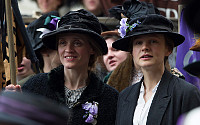| SHADOWS ON THE WALL | REVIEWS | NEWS | FESTIVAL | AWARDS | Q&A | ABOUT | TALKBACK | |||
| Suffragette | |||

| |||
|
dir Sarah Gavron scr Abi Morgan prd Alison Owen, Faye Ward with Carey Mulligan, Helena Bonham Carter, Anne-Marie Duff, Ben Whishaw, Brendan Gleeson, Meryl Streep, Romola Garai, Natalie Press, Geoff Bell, Finbar Lynch, Samuel West, Lorraine Stanley release UK 12.Oct.15, US 23.Oct.15 15/UK Pathe 1h46  Rebels, not slaves: Duff and Mulligan 


 |
R E V I E W B Y R I C H C L I N E | ||
 With a smart script by Abi Morgan, this drama about the British suffrage movement is challenging and deeply moving, avoiding cliches to find present day relevance in a fight that took place a century ago. And it's elevated by a full-throated performance from Carey Mulligan that never hits a false note.
With a smart script by Abi Morgan, this drama about the British suffrage movement is challenging and deeply moving, avoiding cliches to find present day relevance in a fight that took place a century ago. And it's elevated by a full-throated performance from Carey Mulligan that never hits a false note.
In 1912 London, Maud (Mulligan) is a second-generation laundry worker who has had a rough life but is making the most of it now with husband Sonny (Whishaw) and their young son (Dodd). Then her friend Violet (Duff) introduces her to a group of activists led by Emmeline Pankhurst (Streep). Before she realises the scale of the movement, Maud finds herself protesting alongside organiser Edith (Bonham Carter) for a woman's right to vote. But being arrested causes trouble at home and at work, and Maud has to decide whether the fight is worth the cost. Morgan's script adapts the real events to present-day tastes, for example making it look like this movement was driven by the working class when in reality it was a middle class action that excluded working women from voting. Basically, they were fighting for gender equality (working men were also denied suffrage at the time), so the film's somewhat misleading approach still makes a point. And it's in the characters that it carries a real kick. Mulligan brings considerable presence to the focal role as a thoughtful, smart, uneducated woman who has been abused for most of her life and slowly comes to believe that she shouldn't accept this. Her connections with the other cast members are visceral and honest, especially with Whishaw, also excellent in a complex role that stubbornly refuses to remain sympathetic. Others are more lightly shaded, including the fellow activists and the tenacious cop (Gleeson) trying to bring the women down. Gavron's direction keeps the film feeling fresh and modern, despite the gloomy period production design. And Morgan's script is packed with rousing speeches that feel like honest expressions rather than overwritten movie oratory. So when a woman says, "I'd rather be a rebel than a slave," it's genuinely moving because the film has quietly shown that women have been denied their rights throughout history. That it took so long for women to have a voice in their destiny is shocking from our perspective. And yet there's still enough resonance in this story to remind us that full equality is still a dream.
| |||
| R E A D E R R E V I E W S | |||

 Still waiting for your comments ... don't be shy.
Still waiting for your comments ... don't be shy.
| |||
|
© 2015 by Rich Cline, Shadows on the Wall HOME | REVIEWS | NEWS | FESTIVAL | AWARDS | Q&A | ABOUT | TALKBACK | |||
